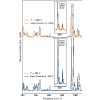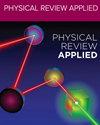First-principles characterization of thermal conductivity in LaPO4-based alloys
IF 4.4
2区 物理与天体物理
Q2 PHYSICS, APPLIED
引用次数: 0
Abstract
Alloys based on lanthanum phosphate () are often employed as thermal barrier coatings, due to their low thermal conductivity and structural stability over a wide temperature range. To enhance the thermal-insulation performance of these alloys, it is essential to comprehensively understand the fundamental physics governing their heat conduction. Here, we employ the Wigner formulation of thermal transport in conjunction with first-principles calculations to elucidate how the interplay between anharmonicity and compositional disorder determines the thermal properties of alloys, and discuss the fundamental physics underlying the emergence and coexistence of particlelike and wavelike heat-transport mechanisms. We also show how the Wigner transport equation correctly describes the thermodynamic limit of a compositionally disordered crystal, while the Boltzmann transport equation does not. Our predictions for microscopic vibrational properties (temperature-dependent Raman spectrum) and for macroscopic thermal conductivity are validated against experiments. Finally, we leverage these findings to devise strategies to optimize the performance of thermal barrier coatings.

基于 LaPO4 的合金导热性第一原理表征
基于磷酸镧(LaPO4)的合金由于导热系数低且在较宽的温度范围内结构稳定,经常被用作隔热涂层。要提高这些合金的隔热性能,就必须全面了解其热传导的基本物理学原理。在此,我们采用 Wigner 热传导公式,结合第一原理计算,阐明了非谐波性和成分无序之间的相互作用如何决定了 La1-xGdxPO4 合金的热特性,并讨论了粒子型和波浪型热传导机制出现和共存的基本物理学原理。我们还展示了维格纳输运方程是如何正确描述成分无序晶体的热力学极限的,而波尔兹曼输运方程却不能。我们对微观振动特性(随温度变化的拉曼光谱)和宏观热导率的预测与实验进行了验证。最后,我们利用这些发现制定了优化隔热涂层性能的策略。
本文章由计算机程序翻译,如有差异,请以英文原文为准。
求助全文
约1分钟内获得全文
求助全文
来源期刊

Physical Review Applied
PHYSICS, APPLIED-
CiteScore
7.80
自引率
8.70%
发文量
760
审稿时长
2.5 months
期刊介绍:
Physical Review Applied (PRApplied) publishes high-quality papers that bridge the gap between engineering and physics, and between current and future technologies. PRApplied welcomes papers from both the engineering and physics communities, in academia and industry.
PRApplied focuses on topics including:
Biophysics, bioelectronics, and biomedical engineering,
Device physics,
Electronics,
Technology to harvest, store, and transmit energy, focusing on renewable energy technologies,
Geophysics and space science,
Industrial physics,
Magnetism and spintronics,
Metamaterials,
Microfluidics,
Nonlinear dynamics and pattern formation in natural or manufactured systems,
Nanoscience and nanotechnology,
Optics, optoelectronics, photonics, and photonic devices,
Quantum information processing, both algorithms and hardware,
Soft matter physics, including granular and complex fluids and active matter.
 求助内容:
求助内容: 应助结果提醒方式:
应助结果提醒方式:


